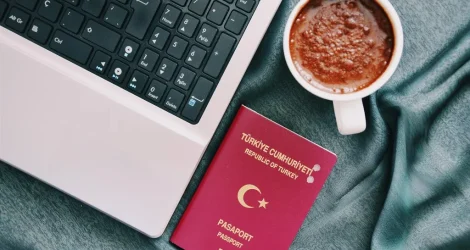Financing Your Turkey Real Estate Investment for Residency
(2025 Guide)
Introduction
In recent years, Turkey has emerged as one of the most attractive destinations for foreign investors seeking both profitable real estate opportunities and a pathway to residency. With the 2025 updates to Turkey’s residency-by-investment regulations, purchasing property remains a viable and strategic route—provided that investors understand the financial requirements and legal nuances involved. Whether you’re considering a cash purchase, a mortgage through a Turkish bank, or alternative financing methods, knowing your options is critical. This guide explores the latest financing solutions tailored for foreign investors and how your financial structure can directly impact your eligibility for Turkish residency in 2025.
Understanding the Link Between Turkey Real Estate Investment and Residency
Investing in real estate in Turkey is not just a financial decision—it can also unlock the door to legal residency. In 2025, Turkey continues to refine its property-based residency pathway to attract serious investors, with enhanced transparency and compliance measures. Understanding the latest legal and financial requirements is key to a smooth application process.
Overview of Turkey’s Residency by Investment Program (2025 Updates)
The 2025 framework allows foreigners to obtain renewable short-term residency permits through real estate purchases. Key updates include:
- Mandatory third-party valuations by SPK-licensed firms
- Digitalized application tracking via the e-ikamet system
- Stricter verification of the source of funds
This program is distinct from the Citizenship by Investment route but remains attractive due to lower thresholds and a simpler process.
Minimum Property Value and Eligible Property Types
As of 2025, the minimum investment amounts are:
- $75,000 USD in major cities (e.g., Istanbul, Ankara, Izmir)
- $50,000 USD in smaller provinces
Conditions:
- Property must be residential (apartment, villa, or new housing unit)
- Must be debt-free and registered under the applicant’s name
- Must be purchased in Turkish Lira via official CBRT exchange
- Commercial or incomplete properties generally not accepted
Why Financing Matters in the Residency Application Process
How you fund the property purchase affects your eligibility:
- If using a foreign mortgage, documents must be:
- Notarized and translated to Turkish
- Apostilled (if issued outside Turkey)
- Full title deed value must independently meet the investment minimum, regardless of financing
- Installment or buyer-seller agreements must be formalized and recorded in the Tapu system
- Non-compliant financing may result in rejection of the residency application
The structure of your financing must demonstrate full transparency, legal validity, and regulatory compliance.
Legal and Regulatory Considerations for Foreign Investors (2025)
Before making any financial commitment, it is crucial for foreign investors to understand the evolving legal landscape of property ownership in Turkey—especially when the objective is to secure residency. As of 2025, Turkey has introduced new compliance standards to ensure transparency and proper documentation for foreign-funded real estate transactions.
Legal Framework for Foreign Property Ownership in Turkey
Foreign nationals can purchase real estate in Turkey under specific legal conditions:
- Citizens of most countries may acquire up to 30 hectares of property.
- Properties must not be located in military or security zones.
- Title deeds (TAPU) must be registered in the buyer’s name, with purchase finalized through the General Directorate of Land Registry and Cadastre.
- A valuation report, issued by a SPK-certified appraiser, is mandatory and must match or exceed the official purchase price.
2025 regulations further emphasize compliance with currency rules and traceability of funds, making legal oversight even more important than in previous years.
Residency Eligibility Criteria Related to Financing Methods
The Turkish government closely examines how the property is financed when assessing residency applications:
- Cash purchases are the most straightforward and preferred method.
- Mortgaged purchases are accepted, provided:
- The buyer’s share in the property value meets or exceeds the legal minimum in full.
- Mortgage contracts and bank documents are notarized, translated, and apostilled if issued abroad.
- Payments must be traceable, originating from accounts under the applicant’s name and converted into Turkish Lira via the Central Bank of Turkey’s exchange rate.
Any indication of third-party financing, undeclared sources of funds, or informal transactions may lead to the rejection of a residency application.
New Rules on Mortgaged Properties and TAPU Restrictions
Recent policy updates have introduced tighter controls on mortgaged properties in residency-linked purchases:
- Properties used as collateral for loans may not qualify unless the buyer’s equity meets the minimum investment threshold exclusive of the mortgage value.
- The TAPU (Title Deed) must be free of encumbrances, or a release letter from the creditor bank must be submitted during the application.
- In cases where installment payments are involved, the full value must be reflected in official documentation and paid within a short timeframe to qualify for residency.
These regulations are intended to ensure that real estate purchases tied to residency are legitimate, financially sound, and free from legal disputes.
Financing Your Turkey Real Estate Investment
Securing property in Turkey as a pathway to residency has become increasingly attractive—but also more regulated. With the minimum investment threshold firmly set and financial transparency becoming more critical than ever in 2025, understanding your financing options is essential. Whether you’re purchasing outright, leveraging credit, or considering structured plans, each method carries implications for both legal eligibility and long-term financial planning.
Cash Purchase vs. Mortgage Options
Paying in full with cash remains the preferred route for investors seeking Turkish residency. It simplifies the legal process, shortens approval times, and avoids complications related to loan documentation. Additionally, cash transactions signal financial stability, a factor looked upon favorably during the residency application process.
That said, mortgages are still viable—particularly for buyers who may prefer to retain liquidity. Foreign nationals can apply for real estate loans from Turkish banks, though eligibility often hinges on:
- Proven income and creditworthiness
- A minimum deposit (often 40%–50% of the property value)
- Approval from the Banking Regulation and Supervision Agency (BDDK)
However, as of 2025, mortgaged properties must be debt-free up to the investment threshold to qualify for residency. The equity portion must be clear and unencumbered.
Currency Exchange Considerations
One of the most overlooked—but critical—factors is currency conversion. In 2025, the Turkish government maintains strict regulations requiring that foreign funds be exchanged into Turkish Lira via the Central Bank-approved mechanism before a property purchase is finalized.
Key takeaways:
- Always use a Turkish bank for currency exchange and document the transaction.
- Retain official foreign currency purchase certificates (Döviz Alım Belgesi) for residency applications.
- Be aware of currency volatility. Timing the transfer may result in substantial gains—or losses.
Working with a local financial advisor or real estate attorney can help mitigate exchange-related risks.
Alternative Financing Structures
For those unable or unwilling to pay fully in cash or qualify for Turkish bank loans, there are alternative paths:
- Offshore financing through international banks or private lenders
- Joint purchases with family members (with the investment share clearly defined)
- Corporate purchases under a foreign entity (subject to additional legal review)
While legally permissible, such routes require thorough documentation and a transparent source of funds to be accepted in residency procedures. Complex structures might trigger further scrutiny from immigration authorities.
Using Developer Payment Plans or Installments (Pros & Cons)
Many Turkish developers now offer installment-based payment plans, especially for new construction projects. These can be appealing for investors who prefer staged payments over large upfront costs.
Advantages:
- Flexible payment schedules
- Lower initial capital requirement
- Possibility to reserve units before completion
Disadvantages:
- You may not be eligible for residency until the full investment threshold is paid and registered.
- TAPU (title deed) may be delayed until full payment—a critical factor for residency approval.
- Some plans carry hidden interest or fees, particularly if extended over long periods.
Due diligence is key. Ensure the developer is reputable, licensed, and provides official contracts in compliance with 2025 property regulations.
How to Get a Mortgage as a Foreigner in Turkey (2025 Guide)
While cash purchases remain popular among international buyers, an increasing number of foreign investors are exploring mortgage financing to acquire property in Turkey—particularly as real estate prices have steadily risen in key cities like Istanbul, Antalya, and Izmir. With regulatory clarity improving and banks actively courting international clients, obtaining a mortgage is now a more accessible and structured process in 2025.
Eligibility Criteria for Foreigners
Foreigners are legally permitted to apply for mortgages in Turkey, provided they meet certain basic eligibility conditions, which typically include:
- Holding a valid passport and proof of legal residence or visa
- Demonstrating a stable and verifiable income source
- Maintaining a favorable credit profile, either locally or internationally
- Purchasing a property that is legally eligible for mortgage and free of encumbrances
Some banks may apply country-based restrictions, depending on geopolitical or risk considerations. As of 2025, most nationalities remain eligible, though enhanced due diligence applies to certain jurisdictions.
Required Documents and Application Process
The mortgage application process has become more transparent, though still document-heavy. Here’s a general breakdown of what’s required:
- Passport copy (notarized and translated)
- Tax identification number (easily obtainable at local tax offices)
- Proof of income (e.g., salary slips, tax returns, or bank statements)
- Credit report (preferably from a recognized international bureau)
- Property valuation report from a licensed appraiser
- Purchase agreement or pre-sale contract
Most banks also require a local bank account and may request additional documents depending on the applicant’s home country or financial profile.
The process typically takes between 2 to 4 weeks, assuming all documents are in order.
Interest Rates and Loan Terms (2025 Update)
As of 2025, mortgage interest rates in Turkey for foreigners’ range between 3.5% and 6.5% per annum, depending on:
- The bank and loan type (fixed vs. variable)
- Loan-to-value ratio (LTV)
- Repayment duration
- Applicant’s financial profile
Loan terms can extend up to 15 years, though most foreign buyers opt for 5–10-year plans to balance payment flexibility and interest costs. Turkish law generally caps the LTV at 50%–60% for foreign nationals, meaning a down payment of 40%–50% is usually required.
It’s advisable to negotiate terms in advance and clarify whether interest rates are fixed or subject to market fluctuations.
Recommended Turkish Banks for Foreign Investors
Several Turkish banks offer tailored mortgage services for non-residents, often with multilingual support and dedicated investment desks. As of 2025, some of the most reputable options include:
- Ziraat Bankası – Known for its government backing and conservative risk assessment, ideal for straightforward profiles.
- Garanti BBVA – Offers flexible mortgage packages and online services in English.
- İşbank (Türkiye İş Bankası) – Well-regarded for transparency and ease of working with foreign clients.
- Yapı Kredi – Offers English-speaking advisors and efficient digital application systems.
Each bank has its own eligibility filters and risk appetite, so it’s wise to compare terms, request preliminary assessments, and consult with a local mortgage advisor or legal counsel before committing.
Practical Tips for International Investors
Navigating the Turkish real estate market as an international investor requires more than just identifying the right property. With evolving regulations, currency dynamics, and financial procedures, being well-prepared can significantly improve your experience—and increase your chances of securing residency successfully.
Avoiding Currency Risk in Property Financing
Fluctuations in exchange rates can dramatically impact your real estate costs. In 2025, Turkey mandates that property transactions by foreigners must be completed in Turkish lira, using official exchange rates published by the Central Bank of the Republic of Turkey (CBRT). This means:
- Convert foreign currency through official banks or licensed exchange offices before transferring to the seller.
- Lock in rates using currency hedging tools or forward contracts offered by global banks to minimize exposure.
- Be cautious of unregulated transfers or informal currency deals, which may violate legal requirements and jeopardize your residency application.
Maintaining a lira-based strategy helps meet legal standards and offers a buffer against currency-driven valuation mismatches during title registration.
Working with Financial Advisors or Legal Experts
Engaging a qualified financial consultant or legal advisor is not just helpful—it’s essential. The Turkish property and residency landscape include detailed regulatory steps, and errors in paperwork or payment channels can delay or invalidate your application. A professional can:
- Interpret current regulations and explain recent updates
- Help structure your financing in line with residency eligibility rules
- Assist with title deed (TAPU) due diligence, especially for mortgaged or installment-based purchases
- Coordinate with banks, notaries, and government offices to ensure smooth execution
In 2025, many foreign buyers are choosing licensed Turkish real estate attorneys who also speak English, Arabic, Farsi, or Russian for seamless support.
Timing Your Investment for Maximum Residency Benefit
Timing matters—both for financial and administrative reasons. Consider these points:
- The property must be fully paid and title transferred before you apply for residency.
- Applications submitted in Q1 or Q4 often experience faster processing due to lower volumes.
- Avoid purchasing just before policy changes or price increases in urban areas, as this may complicate valuation compliance.
- Plan for at least 6–8 weeks from purchase to residency approval to accommodate appraisal, documentation, and biometric appointments.
Starting your investment process early in the year gives you a longer window to complete paperwork and adjust to any unforeseen delays.
Conclusion
Investing in Turkish real estate for residency in 2025 offers both strategic lifestyle benefits and long-term value—provided that buyers approach the process with foresight and informed planning. Whether opting for a cash purchase, bank mortgage, or structured payment plan, understanding the legal, financial, and regulatory frameworks is key to a successful outcome. With currency dynamics, evolving TAPU rules, and more stringent due diligence, working with trusted legal and financial professionals is no longer optional—it’s essential. By aligning your financing method with updated residency requirements and planning your steps strategically, you’ll not only secure your ideal property but also enhance your pathway toward Turkish residency with confidence.
FAQ
Can foreigners still get a mortgage in Turkey in 2025?
Yes. Foreigners are eligible for mortgages from Turkish banks in 2025, provided they meet basic requirements such as proof of income, valid ID/passport, and property eligibility. However, not all banks offer loans to all nationalities, so working with experienced advisors is essential.
Does buying property on a mortgage still qualify for Turkish residency?
It depends. As of 2025, you can still apply for residency through mortgaged property only if the value paid (not just total value) meets the legal threshold (currently USD 200,000) and the mortgage is not held against that qualifying amount. Always verify with legal counsel.
What is the minimum investment required to obtain Turkish residency through property in 2025?
The current threshold is $200,000 USD (or its equivalent in Turkish Lira) for eligible properties, as per the latest 2025 update. The property must be residential, approved for foreign ownership, and free of restrictions under the TAPU registry.
Are developer installment plans a safe way to finance a property for residency?
They can be—but with caution. Many reputable developers offer installment plans, which are attractive for buyers without upfront cash. However, the residency application can only proceed once the full amount is paid and title is transferred. Always have the agreement reviewed by a lawyer.







